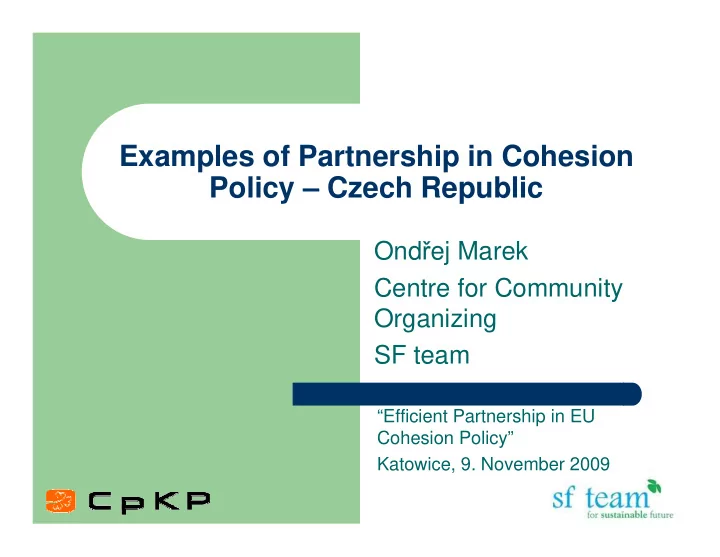

Examples of Partnership in Cohesion Policy – Czech Republic Ond ř ej Marek Centre for Community Organizing SF team “Efficient Partnership in EU Cohesion Policy” Katowice, 9. November 2009
About SFteam for Sustainable Future � a network of NGOs in V4 + NL, LAT, RO, BG (+ CRO) � existing since 2001 � Aim and mission: – to promote that EU Structural Funds could serve for sustainable development through public participation � Tools – facilitation of partnership in programming, implementation and monitoring of SFs; – research and advocacy; – promotion, development of (local, pilot) projects for SFs.
About SFteam - Members � Centre for Community Organizing, Czech Republic � National Society of Conservationists, Hungary � Polish Green Network, Poland � Friends of the Earth – CEPA, Slovakia � BlueLink Information Network, Bulgaria � Focus Eco Center, Romania � Green Liberty, Latvia � Milieukontakt Oost-Europa, The Netherlands
Partnership in Cohesion Policy � Partnership on programming of Structural funds. – Preparing of new program period. – Monitoring committees. – Monitoting and evaluation. � Partnership on implementation. – Partnership projects
Monitoring committees � In Czech republic is 24 OPs. � Most of monitoring committees have 1 representative of NGO sector � Nomination of members to monitoring committees do the managing authority. � For nomination of representatives from NGOs managing authority used advisory body of CZ Government Council for the NGOs -Committee for European Union.
Committee for European Union � One from three Committees of Czech Government Council for NGO - advisory body of Czech government. � In case of Monitoring Committees 100% members comes from NGO‘s
Nomination process. � Managing authority asked Governmental Council for NGO sector for nomination of NGO representative. � Secretariat of the Council send email request for wide nomination. – Self nomination. – Nomination by NGO. � Candidate have to send CV and motivation letter . � Committee for European Union voted between the candidates and gave recommendations for managing authority.
Representative of NGO. � 1 - 3 NGO representatives in monitoring committees. (30 – 50 members in the MC) Generally have the same righta as other members. � (Somewhere only observers) � NGOs’ delegates feel a strong centralization effect from the government. – Preparing of materials - not independent feedback. – No real discussion about problems.
Equal access for NGO. � Lack of capacities of NGO representatives. – Personal costs for organization are not covered � Most of members are from Prague – Because of not cover of the travel expense. � Lack of high educated experts between NGO.
Partnership in Cohesion Policy Purpose � Partnership in programming for 2007-13 � NGO participation in monitoring of SFs � NGOs as project beneficiaries of SFs Coordinator and editor � Pavla Oriniakova, Center for Community Organising (CpKP), CR Methodology � desk research � questionnaires to NGOs (high number) � interviews with selected NGOs, or decision-makers, officials
Topics of Analysis � Programming – public schedule of programming is missing or in delay – low capacities on both sides, especially NGOs – very technical language – time and money for experts � Monitoring – information about Monitoring Committees officially public but often not to be found – technical costs of representation not covered – weight of MCs: real decisions made elsewhere
Topics of Analysis � Implementation – huge bureaucracy – stricter national rules than required by EU – durability of results, continuation not ensured – For NGOsmaller projects: global grants
Main challenges, recommendations � Support role of monitory committees. – Proporcional composition of MC‘s. – Equall access (technical costs) � Good public schedule of programming include schedule of public participation. � Stronger focuse on evaluation of inpact of projects nieder only monitoring of activities.
Thank you for your attention! Ond ř ej Marek Centre for Comunity Organizing ondrej.marek@cpkp.cz www.sfteam.eu ““Efficient Partnership in EU Cohesion Policy” Katowice, 9. November 2009
Recommend
More recommend